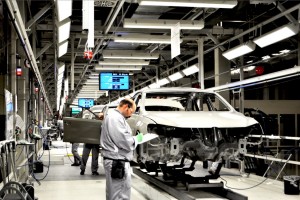
VW's expansion of its Chattanooga, Tennessee plant, could result in 9,800 new jobs totaling $370 million in annual income.
The competition between states offering incentives and promises to secure new auto business is fierce and a new study shows why: money and jobs.
A study from the University of Tennessee’s Center of Business and Economic Research (CBER) indicates that the expansion of Volkswagen’s Chattanooga manufacturing plant to produce a new midsize SUV and the opening of a North American Engineering and Planning Center could create approximately 9,800 jobs and add $370 million in additional annual income, once the plant is fully operational.
“The findings in the CBER study demonstrate that the incentive package recently passed by the Tennessee legislature will result in an economic growth multiplier of several times the state’s investment,” said David Geanacopoulos, executive vice president for Public Affairs and General Counsel, Volkswagen Group of America, Inc.
The subsidies had been controversial because the Tennessee’s conservative political establishment objected to VW’s decision not to oppose an organizing drive by the United Auto Workers.
The UAW lost the representation election last year but now maintains that 55% of the workers at the plant have signed guards asking for UAW representation on the Works Council at the plant and is again pressing for recognition. VW’s management is also under pressure from the union members on the VW board of supervisors, which is now headed by a militant trade unionist, to have a works council at the Chattanooga plant with union representation.
In addition to the 2,400 Tennessee workers directly employed by Volkswagen, the study projects that Volkswagen’s $704 million investment in the Chattanooga plant expansion and new North American Engineering and Planning Center, may generate $217 million of new income and more than 5,300 indirect and direct jobs in Tennessee during the construction and tooling phase.
Volkswagen’s investment will also create roughly 9,800 jobs, once the plant is fully operational, including 1,800 potential jobs at the production plant, 200 engineering jobs at the VW North American Engineering and Planning Center, as well as positions at auto parts suppliers, and other jobs throughout Tennessee.
(VW begins construction on new Chattanooga plant. For more, Click Here.)
The investment will also be responsible for $370 million in additional annual income, once the plant is fully operational.
“Extensive supplier linkages and good incomes earned by Volkswagen employees account for the significant employment gains and economic multiplier effects in Tennessee,” said William Fox, the study’s author and CBER’s director. “This includes jobs in many industries across the state, such as grocery stores, restaurants, shopping malls and construction.”
(Click Here for details about a new four-door coupe for VW.)
Construction for the Volkswagen Chattanooga expansion project is currently underway, and is expected to be completed during the summer of 2016. Production of the Volkswagen midsize SUV is stated to start at the end of 2016. It will be the second Volkswagen model produced in Chattanooga, in addition to the Passat.
With Americans increasingly showing a preference for utility vehicles and trucks, the new SUV is considered vital to the medium-term success of the Volkswagen brand in the United States. The controversy over the union, however, has slowed VW’s planning for entering the SUV market.
(To see more about how Takata officials will be received by lawmakers next week, Click Here.)
“The study underscores Volkswagen’s commitment to Tennessee, and we are excited to grow our team and the Chattanooga plant as we gear up for the production of our first-ever seven-passenger SUV for the U.S. market,” said Christian Koch, president and CEO, Volkswagen Chattanooga, who inherited the controversy last year.

It sounds like VW is actually creating approx. 2000 jobs and the other theoretical jobs are estimates of supplier hires which could be wildly inaccurate. The U.S. can certainly use more jobs however. Let’s hope these new jobs pay comparable compensation to other UAW workers so the employees are not the sacrificial lambs for corporate profits.